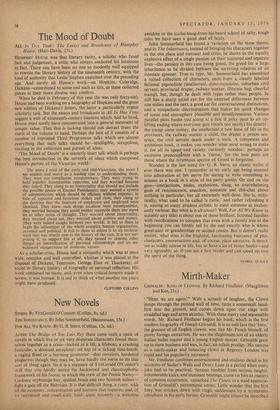New Novels
STORM. By FitzGerald O'Connor. (Collins, 8s. 6d.) AFTER The Bridge of San Luis Rey there came such a spate of novels in which five or six very disparate characters found them- selves together in a crisis—locked in a lift, a lifeboat, a crashing funicular, a doomed aeroplane; on top of a ticking time-bomb, a raging flood or a bursting gasometer---that novelists, hardened plagiarists though they may be. have hardly the nerve to do that sort of thing again. So it is a measure of FitzGerald O'Connor's skill that you hardly notice the hackneyed and claustrophobic framework of his Storm, in which the crew of the Poosie Nancy— Cockney orphanage boy, spoiled Jesuit and two Scottish sailors— fight a gale off the Hebrides. It is that difficult thing, a come, with all the economy, concentration and tautness that requires; and, of its restrained and small-scale kind, quite masterly—a welcome
antidote to the-icicles-hung-from-his-beard school of salty, tough tales we have seen a good deal of lately.
John Sommerfield has found a variation on the same theme, and in The Inheritance, instead of bringing his characters together in the one place and moment and crisis, he shows us the equally explosive effect of a single passion on their scattered and separate lives—the passion in this case being greed, the greed for a large inheritance to be divided between the surviving relatives of an intestate spinster. True to type, Mr. Sommerfield has assembled a mixed collection of characters, each from a clearly labelled fictional pigeonhole (intellectual, demi-mondaine, suburban civil servant, provincial draper, railway worker, illiterate hag, cheerful tramp), but, though he deals with types rather than people, he still has a sharp social eye for the external differences between one milieu and the next, a good ear for conversational distinctions, and a sympathetic discrimination that makes his quick changes of scene and atmosphere plausible and unselfconscious. Various parallel plots bustle you along at a fast if jerky pace to an up- lifting ending where everyone gets (much too neatly) his deserts; the tramp some money, the intellectual a new lease of life in the provinces, the railway worker a child, the draper a prison sen- tence, the civil servant death under a train. A competent and ambitious book, it makes you wonder what went wrong to make it, for all its speed.' and variety, curiously wooden : perhaps an excessive preoccupation with a 'theme,' for the best parts are those where the tyrannous spectre of Greed is forgotten.
Wooden is the last word for G. B. Stern, an elastic stylist if ever there was one. I remember at an early age being stunned into admiration of her nerve for daring to write something as solemn as a book in a style of tea-party gossip. On and on she goes—interjections, asides, explosions, slang, an overwhelming gush of reminiscence, anecdote, nonsense and chit-chat about nothing in particular, but all extremely well done. She is, stylis- tically, what used to be called 'a rattle,' and rather refreshing it is, among so many prudent stylists, to meet someone as exuber- antly verbose. But what is it all about? Well, For All We Know (a suitably airy title) is about one of those brilliant, fictional families with ramifications so complex that even with a family tree at the beginning you can hardly tell by the end exactly who is whose great-aunt or grandmother or second cousin. But it doesn't really matter; what does is, the frightful, fascinating buoyancy of plot, characters, conversations and, of course, plain narrative. It struck me as wildly untrue to life, but so have a lot of better hooks—and very agreeably so, if you are a fast reader and can speed up into the spirit of the thing.
ISABEL QUIGLY


































 Previous page
Previous page